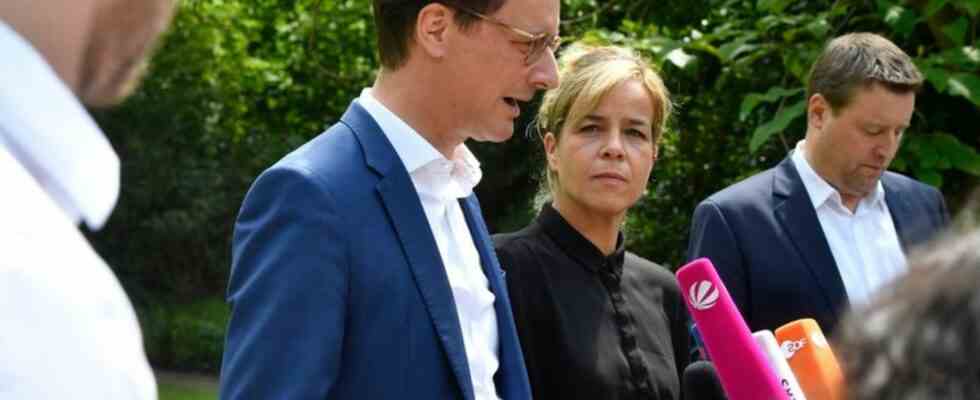state government
CDU and Greens in NRW: coalition agreement good basis
Prime Minister Hendrik Wüst (CDU) and the state chairwoman of Bündnis 90/Die Grünen, Mona Neubaur, in a press statement. Photo: Roberto Pfeil/dpa
© dpa-infocom GmbH
The first black-green coalition agreement for North Rhine-Westphalia emphasizes climate protection, education and sustainability. Prime Minister Wüst and Green Party leader Neubaur see a common compass.
North Rhine-Westphalia’s Prime Minister Hendrik Wüst (CDU) and Green Party leader Mona Neubaur see the first black-green coalition agreement for the state as a good foundation for five years of government work.
In the coalition negotiations, it was possible to “reconcile supposed opposites in order to create something good,” said Wüst at the presentation of the contract on Thursday in Düsseldorf. Both parties share a common compass – more climate protection, a sustainable economy, future-proof infrastructure, investments in education and solid finances.
Neubaur emphasized that the agreement lays the substantive foundation “that can carry us for five years”. Both partners wanted to make NRW the first climate-neutral industrial region in Europe. During this time, the most populous federal state should become more socially just, ecological, digital and economically stronger. Renewable energies would be significantly expanded.
After long negotiations
After just over three weeks of negotiations, the CDU and the Greens had agreed on the coalition agreement. It is entitled “Future Contract for North Rhine-Westphalia”. The local public transport is therefore to be massively expanded. The government alliance wants to hire 10,000 new teachers and 3,000 new police officers a year.
The CDU is to occupy eight ministries, the Greens four. Neubaur said the Greens should have a department for energy and business, a ministry for transport, the environment and nature conservation, and responsibility for families and refugees, as well as the justice department. The coalition agreement available to the German Press Agency shows that the interior ministry, the finance ministry and the school ministry will go to the CDU.
The opposition parties criticized the coalition agreement. SPD party and faction leader Thomas Kutschaty criticized him in the “Rheinische Post” as vague and “full of metaphors and generalities”. FDP parliamentary group leader Henning Höne spoke of a “butter-soft” paper that offered “empty phrases”.
Party congresses of the CDU and the Greens in Bonn and Bielefeld have to vote on the contract on Saturday. The contract could be signed by the heads of the delegations early next week. The re-election of Prime Minister Wüst, who led a black-yellow coalition for eight months as the successor to Armin Laschet (CDU), is planned for next Tuesday in the state parliament. Since the CDU and the Greens have a majority of 115 of the 195 mandates, no surprises are to be expected in the five-party parliament.
On May 15, the CDU clearly won the state election with 35.7 percent. The Greens almost tripled their share of the vote to 18.2 percent and ended up in third place behind the SPD (26.7). The previously co-governing FDP had halved its result to 5.9 percent.

